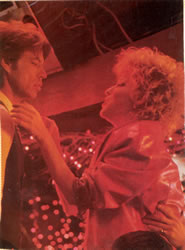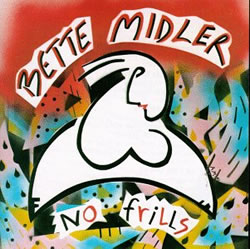|
No
Frills (1983)
Billboard peak: # 60
Tracks: "Is It Love" - "Favorite Waste Of Time"
- "All I Need To Know" - "Only In Miami" - "Heart
Over Head" - "Let Me Drive" - "My Eye On You"
- "Beast Of Burden" - "Soda And A Souvenir"
- "Come Back Jimmy Dean"
Entertainment
Weekly, Jess Cagle  She
needed a hit after the movie Jinxed!, and this spawned two: the harmony-rich ''Favorite
Waste of Time'' and ''Beast of Burden,'' a good- natured ode to masochism by Mick
Jagger and Keith Richards. B She
needed a hit after the movie Jinxed!, and this spawned two: the harmony-rich ''Favorite
Waste of Time'' and ''Beast of Burden,'' a good- natured ode to masochism by Mick
Jagger and Keith Richards. B
Rolling
Stone Magazine (RS 405), Stephen Holden Bette
Midler's notoriously expensive and time-consuming studio albums are attempts to
prove that she's as good a singer as she is an entertainer. This means staying
on pitch, manufacturing different "commercial"-sounding voices to fit
all occasions and downplaying her celebrated humor.
On No Frills-which
she recorded with Chuck Plotkin, Bruce Springsteen's behind-the-scenes engineering
whiz - Midler realizes her ambitions too well. Though her singing is good, the
album is afflicted with artistic quadrophenia, as the Divine Miss M adopts four
distinct personas-a lost little girl, a Janis Joplin-like tough mama, a gospelish
balladeer and a Latin lounge singer-that don't seem connected to one another.
No Frills nevertheless contains three memorable performances. Done with a
sly, sassy  insouciance,
Marshall Crenshaw's "Favorite Waste of Time" may be Midler's finest
rock performance ever. On the Rolling Stones' "Beast of Burden," she
projects an interestingly huffy theatricality. And she infuses the Barry Mann-Cynthia
Weil-Tom Snow ballad "All I Need to Know" with a smoky, oratorical fervor. insouciance,
Marshall Crenshaw's "Favorite Waste of Time" may be Midler's finest
rock performance ever. On the Rolling Stones' "Beast of Burden," she
projects an interestingly huffy theatricality. And she infuses the Barry Mann-Cynthia
Weil-Tom Snow ballad "All I Need to Know" with a smoky, oratorical fervor.
But for a project of this magnitude, too many of the songs fall short of
the singer. Instead of silly pop smut ("Let Me Drive"), tepid technopop
("Is It Love") and preciously arty nostalgia ("Soda and a Souvenir,"
"Come Back Jimmy Dean"), Midler should have gone for the moon and stuck
with songs that measure up to her own gigantic talents.
Consumer
Guide, Robert Christgau  Although
it helps that she gets stronger material than usual from yet another phalanx of
International Pop Music Community pros, what makes this Bette's best studio album
in a decade is a Habana production number set in Miami, a newly written Sophie
Tucker song about a driving wheel, and not-quite-comic readings of Marshall Crenshaw
and Jagger-Richard. What makes it not good enough is the curse of Broadway rock
and roll--the beat is conceived as decoration or signal rather than the meaning
of life, or even music. B- Although
it helps that she gets stronger material than usual from yet another phalanx of
International Pop Music Community pros, what makes this Bette's best studio album
in a decade is a Habana production number set in Miami, a newly written Sophie
Tucker song about a driving wheel, and not-quite-comic readings of Marshall Crenshaw
and Jagger-Richard. What makes it not good enough is the curse of Broadway rock
and roll--the beat is conceived as decoration or signal rather than the meaning
of life, or even music. B-
|



 She
needed a hit after the movie Jinxed!, and this spawned two: the harmony-rich ''Favorite
Waste of Time'' and ''Beast of Burden,'' a good- natured ode to masochism by Mick
Jagger and Keith Richards. B
She
needed a hit after the movie Jinxed!, and this spawned two: the harmony-rich ''Favorite
Waste of Time'' and ''Beast of Burden,'' a good- natured ode to masochism by Mick
Jagger and Keith Richards. B  insouciance,
Marshall Crenshaw's "Favorite Waste of Time" may be Midler's finest
rock performance ever. On the Rolling Stones' "Beast of Burden," she
projects an interestingly huffy theatricality. And she infuses the Barry Mann-Cynthia
Weil-Tom Snow ballad "All I Need to Know" with a smoky, oratorical fervor.
insouciance,
Marshall Crenshaw's "Favorite Waste of Time" may be Midler's finest
rock performance ever. On the Rolling Stones' "Beast of Burden," she
projects an interestingly huffy theatricality. And she infuses the Barry Mann-Cynthia
Weil-Tom Snow ballad "All I Need to Know" with a smoky, oratorical fervor. Although
it helps that she gets stronger material than usual from yet another phalanx of
International Pop Music Community pros, what makes this Bette's best studio album
in a decade is a Habana production number set in Miami, a newly written Sophie
Tucker song about a driving wheel, and not-quite-comic readings of Marshall Crenshaw
and Jagger-Richard. What makes it not good enough is the curse of Broadway rock
and roll--the beat is conceived as decoration or signal rather than the meaning
of life, or even music. B-
Although
it helps that she gets stronger material than usual from yet another phalanx of
International Pop Music Community pros, what makes this Bette's best studio album
in a decade is a Habana production number set in Miami, a newly written Sophie
Tucker song about a driving wheel, and not-quite-comic readings of Marshall Crenshaw
and Jagger-Richard. What makes it not good enough is the curse of Broadway rock
and roll--the beat is conceived as decoration or signal rather than the meaning
of life, or even music. B-